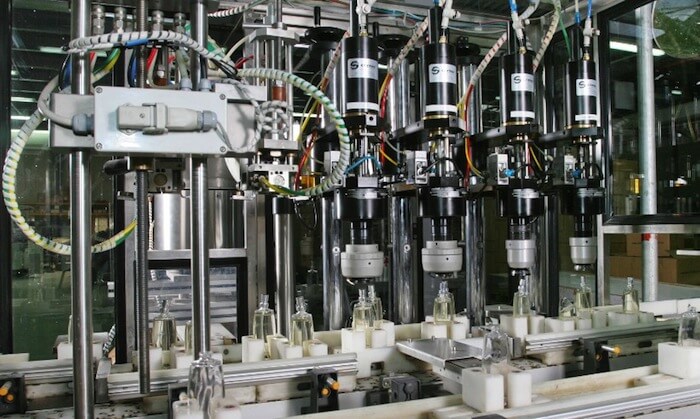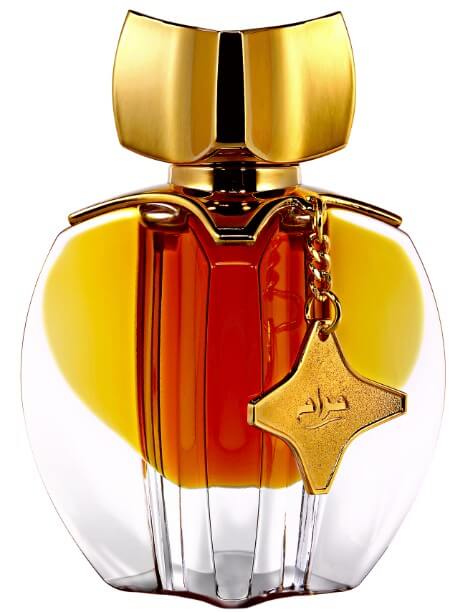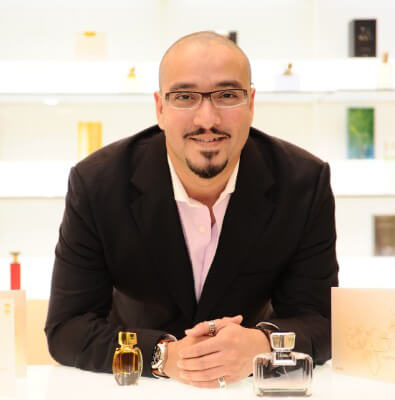In 1951, the Ajmal family business started like many others with the ambitious vision of its founder. Ali Ajmal worked his way up from living in a little Indian village, moving to the capital Mumbai and, finally, sending one of his sons to the UAE where the family established what is today one of the best known fragrance houses in the Middle East. Abdulla A. Ajmal, Deputy General Manager of Ajmal Perfumes and 3rd family generation member, talks to us about the family history, his own career in the company, their recent revamping of the brand and the internationalisation of the brand reflecting the best of both worlds from the East and West.
When you walk into the head quarters of Ajmal Perfumes in Dubai, before being able to notice anything else, your senses are fully absorbed by the strong oudh scent emerging from seemingly every corner of the reception area. Abdulla A. Ajmal, Deputy Managing Director guides us to his office where again we are welcomed by the unmistakable and unique scent of Ajmal perfumes. ‘I have been working for the family business for over 14 years now, and I cannot describe this experience as anything else but an apprenticeship’. After finishing his education in the UK, Abdulla went on to do his MBA, yet when joining his family business he felt like having to start his education all over again. ‘Not everyone can work in fragrances. You literally have to develop ‘a nose’ for it.’ says Abdulla while leaning back in his office chair and looking at us over the heavy frame of his designer glasses.
Everyone Knows Ajmal
Without flattery, it is a fact that Ajmal is one of the best-known perfume brands in the Middle East. We are eager to understand what makes the Ajmal brand so successful and timeless: ‘The main ingredient, if I were to pick just one, is the most important value proposition that was instilled by my grandfather: it is all about the product. There are multi-facetted explanations to how this is the core of Ajmal’s success. We maintain a strict honesty policy when it comes to the delivery of our product. To be honest, we would rather take a beating on the margins than on our brand. Of course, at the time of my grandfather the word brand was never used explicitly; it was always about the product.” Abdulla’s grandfather had so much confidence in his product that he used to say that if his customers did not find it up to the quality standards the company promised, they could throw the product away and get their money back. This confidence became a core value of Ajmal’s overall product development. The business has always had at least one family member involved in the product development to ensure that, no matter what, the product will never be compromised. ‘ That is the core value. Apart from that there are of course all the other things like excellence and human interest that make a great brand. However, if you don’t have the product then everything else doesn’t really matter.’ Abdulla concludes.
Ajmal not only has a core focus on product development but also makes sure that it keeps a closeness to the customer: ‘Initially, I spent a lot of time on the shop floor in retail. We are very fortunate that we have an extensive retail spread, this allows us to accurately gauge the pulse of the market and of our consumers.’ Abdulla says, looking back at his first years in the company. Ajmal is vertically integrated, whereby the family business does everything from the conceptualisation, to the development of the brand, the production of the product, as well as sales, and distribution. This is how it has been since the company’s inception. Abdulla sees two main advantages in this approach; one is that on the business level gains are higher if you are in charge of retail as well, and secondly, an eye can be kept on the quality control at each and every stage of the production. This ‘do it yourself’ attitude comes from the company founder, Ali Ajmal; when he started the business he used to buy the ingredients such as the oudh and the oudh oil and he would then take it to the customer and sell it himself. ’When my father and my uncles took over the business they found this business culture instilled by my grandfather to be a great advantage. Almost all of us have started out on the shop level so we realise the importance of being in touch with the customer.’ Abdulla says smiling at the memory of his retail days.

‘I worked my way up.’ he continues, ‘As is usual in a family business, you don’t end up coming and joining just one area. You tend to do the rounds and spend a certain amount of months in different departments and divisions. In my case when I joined there weren’t as many divisions, there were more departments. I spent almost a quarter in every department to get an idea of how it all works and then I came to marketing, which was more in line with my education and direct expertise. However, the core of the business is smell and unless you have developed your sense of smell to the level of acute recognition there is no point in working even on the strategic level. By that I don’t mean to demean any area. If you can’t smell however, how are you going to sell perfumes?’ Abdulla says when thinking back at how it felt to come to the family business after his rather formal education at business school.
Re-vamping the Brand
After many years of successfully running the business with a focus on the Middle Eastern clientele, the second and third Ajmal family generation started internationalisation procedures. The step outside familiar territory towards serving a global consumer pool required certain adjustment. Hence, Ajmal started refreshing its branding image a couple of years back. We ask Abdulla Ajmal what has changed: ‘Nothing. What’s inside our bottles hasn’t changed at all. Neither have the values. It is just to keep up with changing consumer trends. The new age consumers are looking toward brands that are dynamic. Because we are globally expanding we can’t be showing a face that is only Middle Eastern or very ethnic. Today, our positioning is more ‘Ethnic Chic’. Through this positioning we aim to target the international consumer by presenting products that are modern and global in their reach and outlook At the same time we are maintaining our ethnicity to the extent that it will differentiate us from other brands. Today, we are sold in the Lafayette Gallery in the UAE and hopefully we will be available in Paris soon. And when that time comes we want to be able to compete with the centuries old fragrance houses that are so well established in the West. In order to do that it is important for us to stay true to our heritage.’ Abdulla adds that revamping the brand has nothing to do with loosing core values but is more about making it easier for global consumers to access the product. He reflects ‘Today, people are actually looking for quality: where is the art and the craftsmanship in a product? Ours is a very dynamic industry. The consumer changes his tastes and is asking for better or more development and sometimes we can keep ahead of the requirement curve.’

A Shift in Consumer Preferences
Lately, Middle Eastern perfume consumers have somewhat changed their preferences and have leaned towards more Western scents. Coincidentally, Western consumers seem to have become aware more and more of Middle Eastern scents and have started taking a liking to them. Abdulla has an explanation for this change in attitude: ‘ In the last ten to twelve years you have seen an increased number of Arabs travelling. Not that they haven’t always done so, but today they spend a lot of time in Europe and they shop. They just love travelling. One of the things that they leave behind in their travelling destinations is their smell. Because they are so overwhelming in their way of wearing fragrances, they tend to leave a trail and people have started to acclimatise and appreciate such scents. So much so that they have actually influenced the Western perfumery industry to start creating scents that are more familiar in the Middle East. And you may not know this but some of the top perfumery companies have small fragrance studios in the Gulf. They get inspired by our ingredients and start using them.’ Abdulla explains ‘My uncle has been working with international fragrance houses for the past ten years. So much has evolved since then. It is not like the olden days where a perfumer would take five years to create one fragrance. Today, they don’t have the time because speed has become the name of the game. Innovation has been compromised, therefore, how do you do it? Through collaborative work.’
The Internationalisation Process
The successful internationalisation of a family business always is a rather risky matter. With Ajmal’s strive however to become a conglomerate an international footprint became necessary. While their London opening has been postponed the Eastwards ventures continue to flourish and in May 2010 the first shop in Kuala Lumpur opened. We ask for the main reason for the location choice in Malaysia: ‘Malaysia is a strategic point of entrance. To be honest there was a two-fold objective: we wanted to get away from this very strong stigma of Ajmal being a brand for Arabs. However, if you go to South East Asia or for instance in India, Ajmal is more a brand for Muslims. You always get categorised. Rather than looking at a demographic breakdown, we have to look at it from a more ethnic, cultural or religion based perspective. We wanted to move away from that. We selected Malaysia because it has an interesting mix of cultures and there is decent amount of disposable income. The other thing is that one of the core commodities is oudh; apart from India it comes from the Far East. Malaysia itself has a lot of oudh and oudh oil. A few of our regional customers tend to prefer that type of quality. So when they go to Kuala Lumpur they feel that by being at the source the product will be better. It is a perception thing really but it works. However, we only opened in May 2010 so we haven’t seen any results to strengthen that claim. What we do know is that so far the local clientele loves our products and we are doing far better than we anticipated. It is not seen as an Arab brand; it is something completely different because they are more accustomed to seeing a typical perfumery store. What we did was to make sure that the store incorporated our latest design approach, where you have the traditional approach combined with modern take. Since we have given it this look we are noticing expatriate clientele walking through the store as well without having any reservations.‘
The Family and the Rebranding Strategy
In renewing the brand look the family contributed greatly, Abdulla explains. Of course, there were things that were not to be changed, such as for instance the logo. However, overall the family had a flexible attitude towards the make-over of the brand, which Abdulla attributes to their market savvy attitude. Also, the family was kept involved in every step of the process and final decisions were approved by the directors. ‘It was a team effort.’ He reflects, ‘Their influence has been great actually. I am part of a family that is quite encouraging and open to a lot of the ideas. They realised that growth or rather expansion means including more clientele and to do that you have to be as culturally sensitive as possible. This learning has come from my grandfather. Because you see the thing is, that when he started from his little bit of trading and he moved from this little village in India to Mumbai and then started moving activities to the Gulf he understood that you couldn’t sell a product in the same way everywhere. You have got to adapt somewhat to the local sensitivity.’ The need for revamping the brand was easy to run by the family, however, appointing the right firm to do the job posed somewhat of a challenge. After going wrong once though and learning from their mistakes, the family found a perfect match. The brief for the revamping held clear guidelines: 60% modern 40% ethnic. The redesign was a full success as anyone can see when walking into the new shop in Kuala Lumpur and in a few branches in Dubai.
With the third generation being active in the family business, we ask Abdulla whether he sees great discrepancies between his own and the visions of the previous generations. He gets up and takes us to a back office where each desk is full of perfume bottles; it is the Ajmal design department. We stop in front of a chart that depicts all sorts of bottle designs ranging from 2004 to 2012. ‘I have been involved in product development for the last six years. Ajmal’s vision of its products is documented on a consistent progression as you may see on this chart with a product chronology.’ He explains how this helps the family to keep an overview on the progression of the product and the brand look and therefore maintaining consistency while evolving. ‘New products shouldn’t look too alien but they should be international and differentiated. Our values have to be reflected through the stores and the product and the experiential aspect of it is extremely important: indulgence! In the West, a majority of purchases of the perfumes is done by the partner and not by the person himself or herself and is more from the gifting perspective. Here in the Middle East it is more for personal pampering and use.’
Customers typically spend some time in the environment because they want to feel good about it and walk away with a decision that they had a nice experience. Abdulla explains further ‘The products can’t look alien, the experience has to be good, keeping in mind the global shopping psychology and how is it changing in the West and the East. Yes, the Arab consumers typically likes to be served, but at the same time, initially, they also like to be left alone for a little while, whereas the Western consumer likes to be left alone as much as possible with someone that is always there to help them. So we are keeping these key elements in mind in the design.’
According to Abdulla, all in all the re-branding was a fairly smooth process, but it did take time to get it right. He says ‘If you would ask me today…I wouldn’t have done much different than this. And the response that we see from the consumer is even more gratifying.’

Family Name – Business Name
Like many family businesses the Ajmal company bears the family’s name. According to Abdulla this has more of a cultural role than being a direct business aspect and sees that this affects family members in two ways. He says, “Firstly, kids growing up in a family business are exposed to the business; in my time it was perfumery and a little real estate, today our next generation grows up in a conglomerate. So being part of such a family and carrying the name influences your aspirations to become part of something much bigger. Secondly, in our family the tradition of philanthropy is very strong and comes from my grandfather. So, the family’s vision to donate to charities comes with the family name.’ However, Abdulla feels that the most important aspect of carrying the Ajmal name is that each family member lives with the family’s religious foundation, the value of “giving back” and of being aware that whatever one does, it has an impact on someone else. ‘Bearing the name Ajmal impacts your world view and affects your behaviour, and of course, since it is still quite a unique surname, you are of course directly associated with perfumery.’
In Ajmal, family members are advocates for the brand. A strong tie to the company is built from childhood symbolised by gestures such as custom made perfumes for each newborn baby in the family. ‘My little niece, she is nine years old, is selecting fragrances and she often comes to me and says “Uncle I have made you a bottle design.” Once they start using our products they will do their own part in supporting the business. They, in turn, will tell their friends about it. Not only family members are advocates; even people who are closely associated with us, friends, and acquaintances tend to market the product wherever they go.’
Ten Years from now
Ajmal’s international expansion and also its diversification into different industries holds every promise for success. When we ask Abdulla what the goals are ten years from now he smiles confidently and says ‘Ten years ago we were running a perfumery, whereas now there is no question about it; in the next ten years we are going to be a globally recognised brand.’ After our conversation we feel that it is all bound to happen and we can smell the scent of success that lies in Ajmal’s future.
Tharawat Magazine, Issue 8, 2010
















